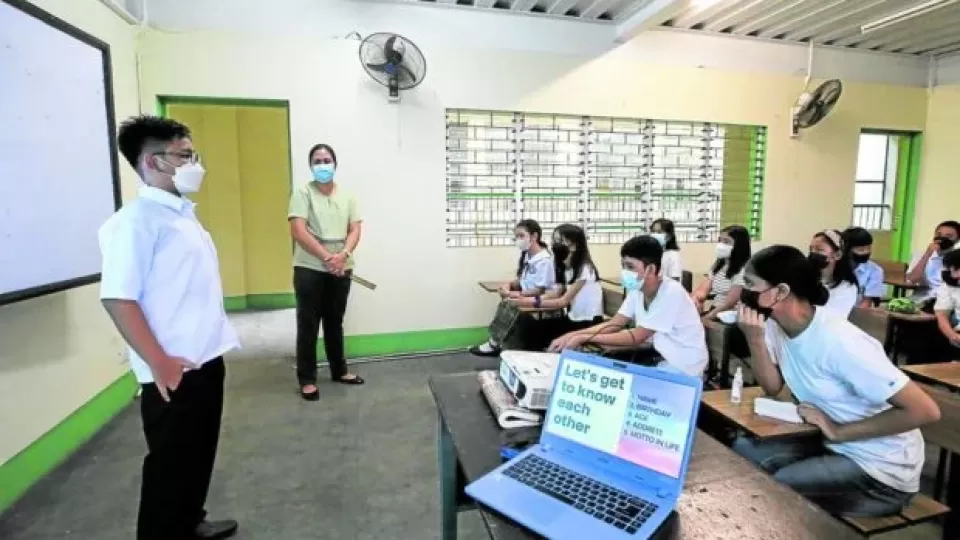October 18, 2022
MANILA — Despite a shortage of classrooms and reported COVID-19 cases among students, all public schools will start full in-person classes as originally planned on Nov. 2, while private schools can continue blended and full distance learning beyond that date, the Department of Education (DepEd) announced on Monday.
Private institutions were also given the option to adopt five-day in-person classes aside from the blended and remote learning modalities.
DepEd earlier mandated all public and private educational institutions to shift to five days of in-person classes beginning Nov. 2, a move that was opposed by teachers’ groups and several private schools.
Under the amended DepEd Order No. 44, all public schools nationwide “shall have transitioned to five days in-person classes” after the adjustment period ends on Oct. 31, or beginning Nov. 2.
“After the said date, no public school shall be allowed to implement purely distance learning or blended learning, except for those that are expressly provided an exemption by the regional director, those whose classes are automatically canceled due to disaster and calamities, and those implementing Alternative Delivery Modes,” it added.
DepEd underscored the “[in]disputable fact” that conducting in-person classes was still the best option for basic education as the agency expressed confidence that it would help the academic development and mental health and well-being of students.
Based on the DepEd’s data released in August, 46 percent, or 24,175 public and private schools nationwide, were implementing in-person classes for five days a week.
The majority of the schools, or 29,721 (51.8 percent), continued holding blended learning approaches, or in-person classes for three days and two days of remote learning.
Seeking exemption
The order issued on Monday amended the earlier policy signed by Vice President and Education Secretary Sara Duterte mandating both public and private schools to implement full in-person classes by Nov. 2.
DepEd said it acknowledged the current situation of the private sector such as their investment in online learning technologies, the institutionalization of best practices in blended learning, and the closure of small private schools.
Hence, the agency said it would let private education institutions decide on the learning modality that they want to implement.
“DepEd, however, hopes that parents/guardians of private school learners would not miss the abundance of scientific studies available on the advantages of in-person classes over online learning,” it said.
The Alliance of Concerned Teachers (ACT) said that while full in-person classes were “urgent and necessary, it cannot be done simply with a written order.”
In a statement, the progressive teachers’ group said it received reports that many schools in Metro Manila and other urban areas were appealing to be exempted from the policy, citing the lack of facilities and human resources.
“Our schools have no other recourse but to appeal for exemption as absorptive capacity was not expanded since the Aug. 22 school opening. Our classes are taking turns in using classrooms and our teachers are already overloaded with teaching and nonteaching duties,” ACT said.
“While we do not wish for the push for 100-percent [implementation of] face-to-face classes to fail, it seems that it is where we are heading given the government’s failure to address our problems,” it added.
Thankful
Private school administrators, however, welcomed the DepEd’s decision.
The Coordinating Council of Private Educational Associations of the Philippines (Cocopea), in a statement sent to ABS-CBN, thanked DepEd for “giving primary consideration to students’ and parents’ choice of [learning] platforms.”
“This also gives the flexibility needed to strengthen innovation in schools and maximize the benefits of hybrid learning modalities, even as we also integrate in-person classes in schools,” it added.
The Federation of Associations of Private School Administrators (Fapsa) also welcomed the recent development, saying that private schools would have suffered more problems if full face-to-face classes were made mandatory starting Nov. 2.
“Even our own parents do not want to send their kids to school daily since the outbreak or COVID-19 is very much around,” Fapsa president Eleazardo Kasilag said.
DepEd is pushing for the return of the traditional in-person setup to address learning losses prompted by school closures due to the pandemic.
The World Bank’s latest report on the state of education noted that after two years of distance learning, nine out of 10 Filipino children aged 10 were still struggling to read simple texts. This made the Philippines one of the countries with the highest rates of “learning poverty” in the East Asia and Pacific regions.


